
| WWT Shows | CLICK TO: Join and Support Internet Horology Club 185™ | IHC185™ Forums |

|
• Check Out Our... • • TWO Book Offer! • |
Welcome Aboard IHC185™  Internet Horology Club 185
Internet Horology Club 185  IHC185™ Discussion Site Main Page
IHC185™ Discussion Site Main Page  Horological Discussions, Questions and Answers
Horological Discussions, Questions and Answers  Pocket Watch Discussions
Pocket Watch Discussions  Hamilton 950 Ratchet Wheel Question
Hamilton 950 Ratchet Wheel Question
 Internet Horology Club 185
Internet Horology Club 185  IHC185™ Discussion Site Main Page
IHC185™ Discussion Site Main Page  Horological Discussions, Questions and Answers
Horological Discussions, Questions and Answers  Pocket Watch Discussions
Pocket Watch Discussions  Hamilton 950 Ratchet Wheel Question
Hamilton 950 Ratchet Wheel QuestionGo  | New Topic  | Find-Or-Search  | Notify  | Tools  | Reply to Post  |  |
| IHC Life Member Site Moderator |
I have a question about the Hamilton 950 ratchet wheel. On most 950's the ratchet wheel has the washer (or whatever you call it) around the jewel of the barrel. I have seen a few that do not have the washer & have seen comments that it is missing. I recently purchased number 753829 a 950 made in what appears to be the 2nd run in 1911, it was missing the washer from the ratchet wheel. I purchased a new one from Past Time but when it arrived the screw holes are too far out from the holes in the wheel. Searching the site I found two old Hamilton ads that show the 950 without the washer. My question is was that sometimes not put on the 950. It would appear that they would have had to have to ratchet wheels, one with the spacing in the holes to accept the washer & one with then holes closer to the jewel. Mine isn't in the below photographs, I haven't reassembled it yet. These photos I took from other posts on the site. The 1st both 950's one without the washer & one with.  | ||
|
| IHC Life Member Site Moderator |
This is an ad from elsewhere on the site, it is listed as from 1919  | |||
|
| IHC Life Member Site Moderator |
Another ad from elsewhere on the site. I guess I could look for another ratchet wheel that will accept the washer but it would appear that they were also made without. I look forward to any comments or ideas. Thanks Tom 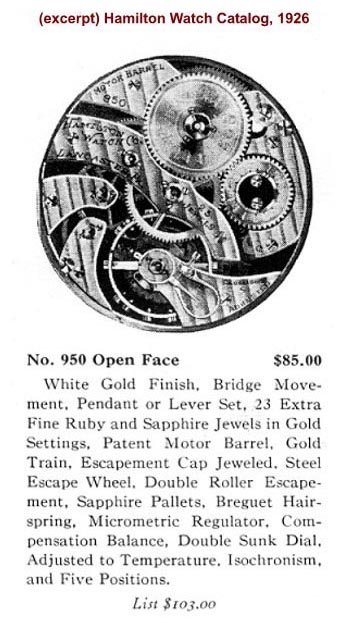 | |||
|
| IHC Life Member Site Moderator |
Got my new main spring from Brian today & got the movement back together & running. After putting it back together I again checked the washer & besides the screw holes being to far out I also discovered the jewel setting is larger than the diameter of the washer hole. After seeing the ads I posted above it would seem to me that Hamilton made these both with & without the washer. Most appear to be with the washer, at least the majority of the photos have them. Here is mine back together & also the new washer I bought. Tom 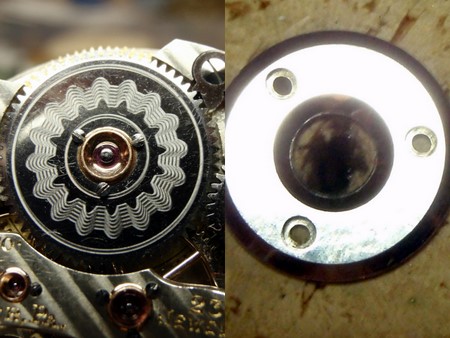 | |||
|
| IHC Life Member Site Moderator |
Found one like mine listed on ebay that is 119 numbers later than mine but from the same run. 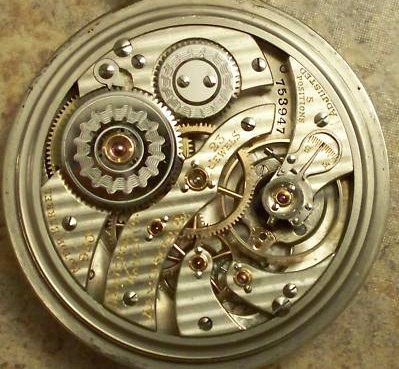 | |||
|
| IHC Life Member Site Moderator |
Here is another, 1060 before mine. 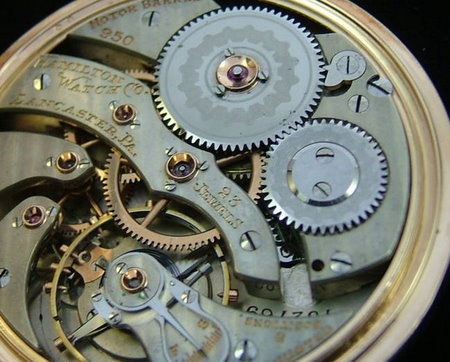 | |||
|
| IHC Life Member Site Moderator |
Here is a cropped version of another Hamilton ad from 1925, it also does not appear to have the washer. 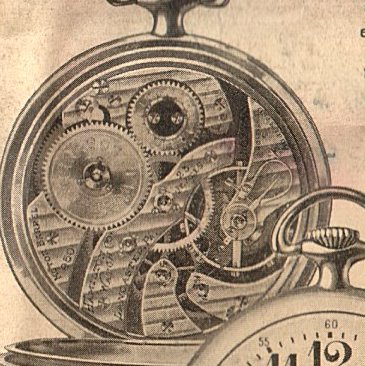 | |||
|
| IHC Life Member Site Moderator |
Another from 1919 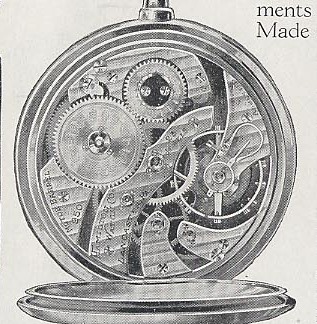 | |||
|
| IHC Life Member Site Moderator |
Another movement  | |||
|
Tom, from my engineering background I would say the second picture was never made to hold down a second item like the first one is because the screw heads are counter-sunk. Yours appears to be a two part recessed for the jewel hold down where the other is not recessed so the hold down is on top of the wheel. In my opinion the one you have appears to be a better engineered solution, may not be the most common but in my book I would prefer yours over the other solution. | ||||
|
| IHC Life Member |
With all the evidence you have presented, it sure looks like yours should not have the washer. Roger | |||
|
| IHC Life Member Site Moderator |
Thanks for the comments, I agree it appears Hamilton must have made these two ways & it would appear both at the same time. I have no idea why but from the advertisements & the watches I found it would appear that is what they did. I have no idea if they continued this process through out the life of the 950 or not. Seems kind of strange but without being there at the time I guess some reasons we will never know. I know if I decide to sell the watch at a later date I will be told that it has a missing jewel cover & will probably sell for less than one with the cover but I guess that is how it goes. Tom | |||
|
Tom you see the same situation on the Elgin grade 270 no matter if it is marked Veritas or marked 270, some have fancy wheels and some have polished beveled wheels with no rhyme or reason. Tom also if you ever get to the mood to sell and no one likes it because of that fact drop me a PM, it would not be an issue for me. | ||||
|
| IHC Life Member Site Moderator |
Thanks Claude, as soon as I get the dial etc back on I will post some photos of it complete, it has a very nice 4 footed dial. Tom | |||
|
| IHC Life Member Site Moderator |
Next time someone has a 950 apart I would be interested in seeing the ratchet wheel with the cover removed, I am curious where the screw holes are located. Thanks Tom | |||
|
My 950, serial number 1576687 was missing the ratchet wheel, cover and jewel. I ordered them from Past Time and the cap didn't line up with the ratchet holes. I find you article interesting. I sent the watch to a professional for restoration. I have sent him this article too. This could explain the issue I was having also. I even order 2 different caps to see if they were maybe miss labled. Thanks for the information. Dan | ||||
|
| IHC Life Member |
With the somewhat awkard construction of these motor barrels there were two advantages to dropping the hubcap/Jewel locator thingy. First it is one less part to make, and second it reduces the concentricity error of an already very complicated press fitted-to-barrel cover ratchet wheel mounting arrangemwent. | |||
|
| IHC Life Member Sergeant at Arms |
Aloha Tom With the preponderance of the evidence that you have put forward it looks like I have been in Possession of disinformation and have been guilty of spreading said disinformation. So, in the interest of Horology let me know where to send my 950 so that you may verify your theory. Mahalo and Aloha Scott | |||
|
| IHC Life Member Site Moderator |
Your welcome Daniel, I would be interested on the results your watchmakers comes up with. I was looking at Past Times web site after posting this info, I noticed they also carry a NOS ratchet wheel listed for the 950 that looks like it would fit the washer or cover I had bought, unfortunately it didn't look like they carried the jewel setting. I wish I could find more information about the differences between the two 950's but so far I haven't been able to. Tom | |||
|
| IHC Life Member Site Moderator |
Hi Scott I am just curious to see the ratchet wheel with the cover off. I just wondered where the screw holes are located & perhaps the diameter of the hole for the jewel. I know you are not the first to think the cover is missing & from reading posts & looking at photos of the 950, I assumed they all came with the cover. When I bought this one I automatically assumed it was missing & ordered a replacement before I even had the watch in my hand. I really don't know what to make of this, if it wasn't for those factory ads showing the watch without the cover I would have said somebody monkeyed with this watch. I am also surprised this hasn't come up before & I am still open to being wrong. When I started this topic I was hoping someone would say "this is the way it was ...." Tom | |||
|
| IHC President Life Member |
See what you think of this explanation... Before we proceed it might be important to recognize that each of the four examples of artistic renderings or drawings that Tom cited are in fact the very same drawing shown four times. That is easily established by the shadows and other details in the drawing. Remember that is not a photograph of a watch but rather an artist's conception. Often the artist drew something that differs with the actual movement which may have occurred in this particular instance. I could cite a number of examples of perceived artist's errors including an ad where the manufacturer's name is flipped over in the opposite direction from how it appears on actual movements. Next we must recognize the pattern on the wheels in that drawing Tom shared is not even the 950 style of damaskeening. That causes me to question the accuracy of the drawing that shows no cover and whether Hamilton ever actually produced movements without the barrel cover in place, my feeling is they most likely did not. Looking more closely at the "1919 Red Book" ad which is taken from page 31 of the Ehrhardt Hamilton book and the drawing on the lower left example in that ad which shows a jeweled barrel with cover in place is somewhat closer to what we would expect to find in other Hamilton advertising as well as on actual watches. Speaking of actual watches, looking at several 950 examples, number 750221 which is the 21st number blocked for a Pendant-Set 950 in 1911 production has the very attractive polished cover as shown in the image below this posting. Likewise number 750352 has the cover as does 846705 from 1912, 1020158 from 1914 and moving forward 1634037 from 1923 all have the cover in place. Other grades with the same style barrel jewel and cover include grades 952, 996 and the 950 Elinvars. All told I found more than a dozen known to be correct examples spanning the years 1911 through 1940 from the earliest to the latest, all with the highly polished cover. My impression is the ones we see without the decorative cover may turn out to be movements fitted with replacement barrels that have a larger outer diameter jewel setting over which the decorative cover will not fit. After all, we know that replacement parts often differ with those originally used in production, perhaps someone who has parts or those who have replaced barrels could address that theory. In fact, Dan may have supplied the answer already because of the differences he is finding on his replacement parts as well as Tom's finding of the "New-Old-Stock" parts which include the decorative cover like the examples I cited above in this posting. I believe they all originally came with the smaller outer diameter jewel and decorative cover. That is my take on it, let's hear yours! Lindell One of many with the original style barrel cover... 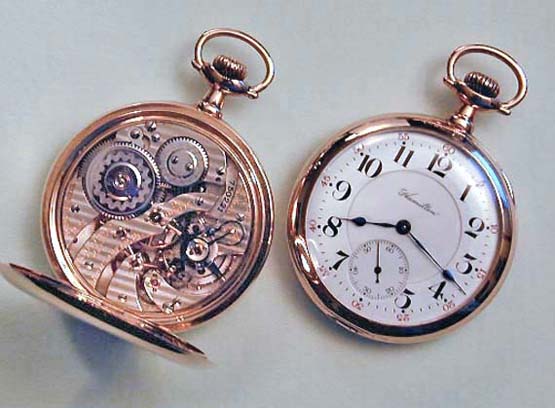 | |||
|
| IHC Life Member Site Moderator |
Hi Lindell Your theory sounds possible & as you said the ads are only drawings. I do find it unusual though that the ones like mine do have the pattern on the wheel as yours yet the screw holes are apparently closer to the inner edge & the diameter of the hole is larger. If these were replacement parts who made them & why. I don't really expect an answer to those questions, it just seems to me the pattern matches so well that I would have that Hamilton would have made the part. Now granted I don't have near the knowledge or experience that you or other members have. I am just not convinced these were not factory made this way. I am not trying to be stubborn and if my watch is wrong it is what it is, I just think it unusual that if these were all fixed with replacement parts they are fixed exactly the same. If you notice the three screws that hold the jewel on my watch are also different from the screws that hold the cover in place on yours. So if these were repaired watches the jewel & setting, the ratchet wheel & the 3 screws would have to be replaced in every repair & that makes me ask why replace so many parts & also what was being fixed? Was the jewel broken & they couldn't find new ones, sis the ratchet wheel break? I guess we may never know the answer but thank you everyone for your input. Tom | |||
|
| IHC Life Member Sergeant at Arms |
Aloha Tom Call me @ 760 408 5649 so that I can get your address and send you my 950 for comparison. Mahalo Scott | |||
|
| IHC President Life Member |
The replacement parts may have been supplied as a kit including screws, but I also see one of the examples you showed above, in fact if I understand correctly it is your watch, has the factory-style counter-sunk screws along with what I perceive as a replacement barrel. Teeth will chip off these wheels, less than skilled repair personnel tend to damage these complicated set-ups, look at what Dave who has had a few of these apart said above... _____________________________________________ QUOTE: "With the somewhat awkard construction of these motor barrels there were two advantages to dropping the hubcap/Jewel locator thingy. First it is one less part to make, and second it reduces the concentricity error of an already very complicated press fitted-to-barrel cover ratchet wheel mounting arrangement." - Dave Abbe _____________________________________________ From Dave's comments apparently the replacement parts were designed to go together more easily which could explain the different appearance. After all the owner never saw the movement, they just wanted it to function. Sadly, these did not really have to be disassembled during every service but rather only when the mainspring was being replaced. We find the screws badly bunged and the covers are often scratched, on these and on the 23-Jewel Bunn Specials which employed a similar design. Some people who worked on them should not have been, they lacked the precise manual dexterity needed to do this kind of work without causing additional damage. I really think the ones with a factory-finished, complete look will always be preferred by collectors. Lindell | |||
|
| IHC Life Member |
Here is mine with the Hubcap. With some patience the fitted mainspring arbor need not be disassembled and it is even possible to leave on the ratchet wheel if you are careful. Sadly it seems some of the early watch makers were less than careful sometimes. This one is an early 952, same deal as the 23J with no caps, but what the heck . . . . 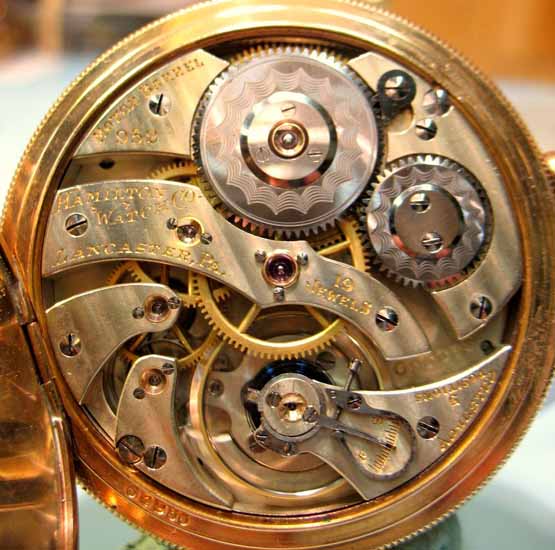 | |||
|
Tom, Here is one that one of our members recently sold on e-bay. If 3 screws are good, 4 must be better! 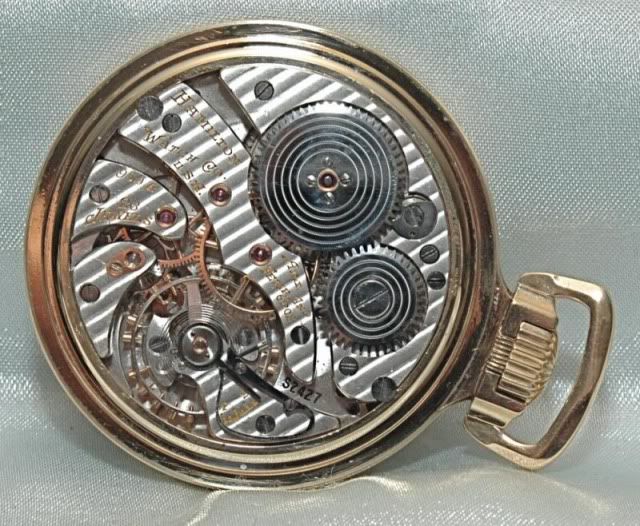 | ||||
|
| IHC Life Member Site Moderator |
Thanks Lindell & Dave, you are more than likely correct, it was the ads that also got me to wondering. I guess I will start looking for parts & see if I can make this look like the others. Mine doesn't have the countersunk screw heads. Also how do you tell a replacement barrel, mine had the serial number in the barrel cover. Thanks Tom | |||
|
| IHC Life Member |
For what it's worth, the ratchet wheel cover on my pendent set 950, SS785,630, looks just like the cover in Lindell's photo, including the "washer." | |||
|
| IHC Life Member Site Moderator |
Ethan Is that the correct photo? I can't see a washer or cover on that wheel & to me it looks like mine. Maybe it the angle & I can't see the washer. Tom | |||
|
| IHC Life Member Site Moderator |
I don't know if this will add to the confusion but I was looking for some parts & I asked Brian what his books showed as to parts for the 950. Hamilton listed the motor ratchet wheels like this; 681040 flat grades 950-952 681041 hubbed: grades 950-950E-952 Tom | |||
|
| IHC Life Member Site Moderator |
I located some more information on the Hamilton 950's ratchet wheel. According to the Library Halligan's notes; In 1911 serial number 846501 a new motor ratchet was introduced. Looking up the serial numbers of the 950's in question according to the Gleason list these were not finished in numerical order; 752769 1910 (no cover) 752868 1910 (no cover) 753829 1910 (no cover) mine 753947 1910 (no cover) 750221 1911-1913 (cover) 750352 1911-1913 (cover) 846705 1912-1913 (cover) 1020158 1914-1917 (cover) 1634037 1922-1923 (cover) So from the Gleason list even though some of the serial numbers with covers on the ratchet wheel are earlier numerically, they are actually newer production wise. All of the ones like mine were made in 1910 prior to the change in the motor ratchet. I also think this is why the parts list Brian Cavanaugh gave me has two different ratchet wheels listed. I would be interested in anyone's thoughts. Tom | |||
|
| Powered by Social Strata |
| Your request is being processed... |
|
Welcome Aboard IHC185™  Internet Horology Club 185
Internet Horology Club 185  IHC185™ Discussion Site Main Page
IHC185™ Discussion Site Main Page  Horological Discussions, Questions and Answers
Horological Discussions, Questions and Answers  Pocket Watch Discussions
Pocket Watch Discussions  Hamilton 950 Ratchet Wheel Question
Hamilton 950 Ratchet Wheel Question
 Internet Horology Club 185
Internet Horology Club 185  IHC185™ Discussion Site Main Page
IHC185™ Discussion Site Main Page  Horological Discussions, Questions and Answers
Horological Discussions, Questions and Answers  Pocket Watch Discussions
Pocket Watch Discussions  Hamilton 950 Ratchet Wheel Question
Hamilton 950 Ratchet Wheel Question©2002-2025 Internet Horology Club 185™ - Lindell V. Riddle President - All Rights Reserved Worldwide

